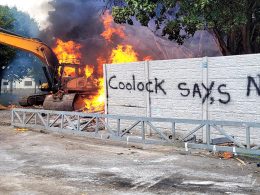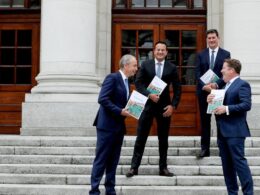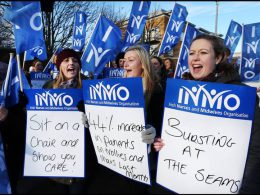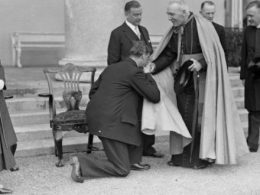By Sean Burns
Journalists Barry McCaffrey and Trevor Birney featured in the No Stone Unturned documentary have won their case against the PSNI for the harassment, intimidation, arrest and spying they suffered for refusing to reveal their sources. Those journalists shone a light on the past crimes of the British State and sought to give truth to the victims’ families.
Collusion and cover-up
They were first arrested in 2018 over an alleged theft of a police watchdog document that appeared in their documentary, which explored the notorious Loyalist Massacre in Loughinisland in 1994. On this night, the UVF entered the Heights Bar in Loughinisland with assault rifles; the pub was crowded with people watching the Republic of Ireland play against Italy, and the men fired more than 60 bullets into the room. Six men were killed. There were serious issues with the investigation, including strong evidence suggesting links between the RUC and the Loyalist paramilitaries. This was a fact the British State and the PSNI sought to cover up.
One of the journalists, Barry McCaffrey, summed up this experience:
“…it is deeply disturbing that we have had to drag police kicking and screaming through endless court hearings, and at every turn, the police have attempted to block and frustrate any early resolution to this case. Even at the 11th hour last night, the police were still trying to gag us from talking publicly about the facts of our case.”
Truth and justice denied
Despite this ruling, the families of the victims are unlikely to get the truth that they desire. The actions of the State are adding to the hurt and trauma of the families of the victims as their desire for truth is obstructed at every turn. It is in the power of the Chief Constable to release
the documents and information pertaining to the massacre tomorrow, if he so desires. But he will not.
This is no surprise. Contrary to the narrative presented by the British State of being a neutral arbiter during the Troubles, security forces, the British Army and the RUC, were in fact actively involved in the conflict and played a sordid role within it to defend the interests of the British ruling class. This can be seen in the direct and indirect (in the form of collusion with Loyalist paramilitaries) atrocities that they carried out and the general repression they enforced.
They have no interest in bringing out this truth. This approach was summed up by former Secretary of State Theresa Villiers when she claimed, despite all evidence to the contrary, that the many examples of collusion between the State and Loyalist paramilitaries represent a “pernicious counter-narrative” and a “deliberate distortion of the truth.”
Avoiding scrutiny and accountability
Meanwhile, Starmer has reneged on his promise to repeal the Legacy Bill fully, a bill that gives amnesty for all those involved in atrocities during the Troubles. The previous Tory government brought this in to avoid accountability and scrutiny of the British State’s crimes. Starmer’s intention to “reform” represents him dragging his feet when it comes to shining a light on the truth. Any real accounting would expose the horrific role of state forces in murder and collusion. To do so would expose the deeply undemocratic and oppressive nature of the British ruling class.
The past is still used as a weapon today by all forces that were part of the conflict, namely the British and the sectarian parties. The pain, sorrow and deeply felt anger are used cynically to further their own agendas. What is necessary instead is to engage in the most open and honest process possible. It is clear that none of the actors of the Troubles have the capacity to be genuine in leading such an initiative, but there is one force that does: working-class people. People whose lives today are still impacted by sectarian division.
Such a process could look like a wide-ranging enquiry into the conflict but independent of the State or sectarian parties. This would have to be predicated on the full opening of the books, both state secrets and the secrets of paramilitaries. Such a process would help, and be part of creating a real peace process – one that actually seeks to create “reconciliation, tolerance, and mutual trust”.












